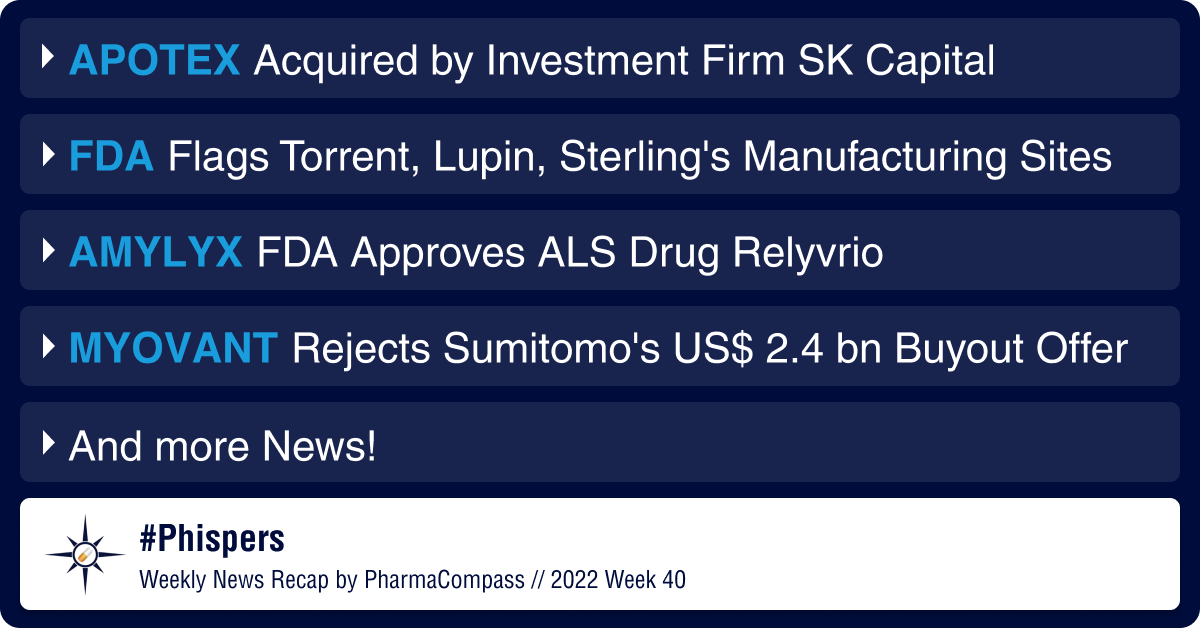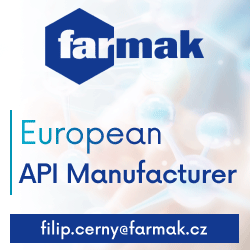
By PharmaCompass
2022-10-06
Impressions: 5,520 Article
In this week’s Phispers, the US Food and Drug Administration (FDA) has approved Amylyx Pharmaceuticals’ Relyvrio as a treatment for slowing the progression of amyotrophic lateral sclerosis (ALS) in adults. The agency has also approved Sanofi and Regeneron’s Dupixent (dupilumab) as a treatment for adult patients with prurigo nodularis, a chronic and debilitating skin disease.
In M&A news, New York-based private investment firm SK Capital has acquired Canada’s largest producer of generic medicines – Apotex Pharmaceutical Holdings. And Incyte has agreed to buy preclinical biotech Villaris Therapeutics in a deal valued at up to US$ 1.4 billion.
Sanofi has inked a research partnership and licensing deal with biotech miRecule for up to US$ 430 million to develop an antibody-RNA conjugate to treat a genetic muscle disease known as facioscapulohumeral muscular dystrophy (FSHD). And Bristol Myers Squibb has inked two deals – one with San Francisco-based SyntheX and the other with London’s Autolus Therapeutics.
Meanwhile, Myovant Sciences has rejected a US$ 2.4 billion buyout offer from Japanese conglomerate Sumitovant Biopharma, as it found the bid to be significantly lower than its expectation.
An appeals court in the US has rejected Eli Lilly’s request to invalidate three patents by Teva Pharmaceuticals in a four-year-long lawsuit regarding competing migraine drugs. And GSK’s PD-1 inhibitor Jemperli and chemotherapy combo shrank tumors as well as Merck’s Keytruda’s chemo combo in patients with newly diagnosed metastatic nonsquamous non-small cell lung cancer (NSCLC).
The WHO has said contaminated cough and cold syrups manufactured by an Indian drug manufacturer — Maiden Pharmaceuticals — may have caused the deaths of several children in The Gambia from acute kidney injuries.
In regulatory news, the FDA has issued a Form 483 with three observations to Torrent Pharmaceuticals’ manufacturing unit at Indrad in the Indian state of Gujarat. Another Indian drugmaker, Lupin, has received a warning letter from the FDA for its manufacturing facility at Tarapur in Maharashtra, India. The agency has also issued a warning letter to Sterling Pharmaceutical Services’ manufacturing facility at Illinois for cGMP violations.
The FDA has also
unveiled a pilot program to shorten the time from the date of complete
submission to the action date for therapies that address an unmet medical need.
And Takeda has decided to discontinue global production of its
hypoparathyroidism medication Natpara at the end of 2024 after failing to sort out
long-standing production issues.
SK Capital buys Canada’s largest generic drugmaker Apotex
New York-based private investment firm SK Capital has acquired Canada’s largest producer of generic drugs Apotex Pharmaceutical Holdings. The details of the sale and the amount has not been disclosed. In 2019, Apotex was said to be valued at around US$ 3 billion.
The generic company was founded by billionaire Barry Sherman in 1974. Rumors of a sale have been going round since last November, after the company was ordered to pay US$ 49 million to resolve price-fixing allegations of its cholesterol drug pravastatin.
Apotex employs over 8,000 staffers, operates in more than 45
countries and has the capacity to produce 24 billion tablets and capsules a year. It has been in trouble since the death of Sherman and his wife around five years ago.
FDA approves Amylyx’s ALS drug Relyvrio; med to cost US$ 158,000 per year
The US regulator has approved Amylyx Pharmaceuticals’ Relyvrio as a treatment for slowing the progression of amyotrophic lateral sclerosis (ALS) in adults and potentially delaying death. Relyvrio is the third ALS drug to be approved by the FDA after Japanese drugmaker Mitsubishi Tanabe’s Radicava and generic drug riluzole.
ALS or Lou Gehrig’s disease affects over 30,000 patients in the US. It breaks down nerve cells in the brain and spinal cord and leads to progressive paralysis and death. Relyvrio works by preventing nerve cells in the brain and spinal cord from dying prematurely.
The drug’s approval is based on data from a placebo-controlled phase 2 study where it showed a limited but statistically significant impact. The drug also extended patients’ lives by a few months. The drugmaker is currently carrying out a phase 3 trial of around 600 patients.
Amylyx has priced the drug at around US$ 12,500 for a 28-day prescription, or about US$ 158,000 per year in the US, drawing criticism from some ALS advocates and outside observers. Amylyx expects Relyvrio to become commercially available in the US within the next four to six weeks. In Canada, the drug received conditional approval in June.
FDA nod for bile duct cancer med: Otsuka’s subsidiary Taiho Oncology has received an
accelerated approval for its drug Lytgobi (futibatinib) to treat adults with previously treated, unresectable, locally advanced or metastatic intrahepatic cholangiocarcinoma (a type of bile duct/liver cancer). Lytgobi’s approval is based on a single-arm phase 2 trial that enrolled 103 patients.
WHO links child deaths in Gambia to cough syrups made in India, issues alert
The World Health Organization (WHO) has said contaminated cough and cold syrups manufactured by an Indian drug manufacturer may have caused the deaths of several children in The Gambia from acute kidney injuries. The WHO linked the deaths to the syrups after lab analysis revealed “unacceptable” levels of diethylene glycol and ethylene glycol, both of which are toxic and can cause acute kidney injury.
The syrups have been “potentially linked with acute kidney injuries and 66 deaths among children,” it said. The products were manufactured by New Delhi-based Maiden Pharmaceuticals.
The WHO has issued a medical product alert asking regulators to
remove four Maiden Pharma products – Promethazine Oral Solution, Kofexmalin Baby Cough Syrup, Makoff
Baby Cough Syrup and Magrip N Cold Syrup – from the market. The UN agency said it is conducting an investigation in collaboration with Indian regulators.
Torrent’s India site hit by FDA’s Form 483; Lupin’s Tarapur site gets warning letter
The FDA has issued a Form 483 with three observations to Torrent Pharmaceuticals’ manufacturing unit at Indrad in the Indian state of Gujarat. The agency had carried out an inspection during September 19-28.
None of the observations are related to data integrity, the company said. The drugmaker plans to respond within the stipulated time, and work closely with the FDA to address the issues at the earliest.
Another Indian drugmaker, Lupin, has received a warning letter from the FDA for its manufacturing facility at Tarapur in Maharashtra, India. The agency had inspected the facility between March 22 and April 4 and had issued a Form 483 with four observations. Lupin said the warning letter will not disrupt supplies or the existing revenues from operations of this facility.
Warning letter for Sterling’s Illinois facility: The FDA has issued a warning letter to Sterling Pharmaceutical Services’ manufacturing facility at Illinois for violations of current good manufacturing practice (cGMP) regulations for finished pharmaceuticals. The agency had inspected the site between February 7 and 18 this year. The letter notes that the facility failed to establish an adequate system for monitoring environmental conditions in aseptic processing areas. It also failed to thoroughly investigate discrepancies or failures of a batch to meet any of the specifications.
Since last September, Pennsylvania-based biotech Verrica Pharmaceuticals’ skin disease treatment, VP-102, has been rejected twice by the FDA due to
issues at Sterling, its contract manufacturer. In May, the drug was rejected after
Sterling was placed on an official action indicated
(OAI) status by the FDA, the most serious category of violation.
Sanofi-Regeneron’s Dupixent becomes first drug in US to treat prurigo nodularis
The FDA has approved Sanofi and Regeneron’s Dupixent (dupilumab) for the treatment of adult patients with prurigo nodularis, a chronic and debilitating skin disease that affects around 75,000 adults in the US. The approval makes Dupixent the first and only medicine to treat the condition in the US. The approval is based on data from two phase 3 trials. The European Medicines Agency is also reviewing a regulatory filing for Dupixent in prurigo nodularis. The companies are also planning to apply for authorizations in other countries this year.
Sanofi partners with miRecule: Sanofi has inked a research
partnership and licensing deal with Gaithersburg,
Maryland-based biotech miRecule for up to
US$ 430 million to develop an antibody-RNA
conjugate (ARC) to treat a genetic muscle
disease known as facioscapulohumeral muscular dystrophy (FSHD).
Incyte buys Villaris for potential US$ 1.4 billion with eye on skin disease drug
Delaware-based biotech Incyte has agreed to buy Villaris Therapeutics in a deal valued at up to US$ 1.4 billion. Incyte will pay Villaris US$ 70 million in cash, and the preclinical biotech is eligible for another US$ 310 million in development and regulatory milestones. Incyte has also lined up another US$ 1.05 billion in commercial milestones based on net sales.
The deal will give Incyte exclusive global rights to Villaris’ lead candidate auremolimab, an anti-IL-15Rβ monoclonal antibody being investigated for vitiligo. The drug is in preclinical studies and is slated to enter the clinic in 2023.
Myovant rejects Sumitomo Pharma’s US$ 2.4 billion buyout offer
Myovant Sciences has rejected a US$ 2.4 billion buyout offer from Japanese conglomerate Sumitovant Biopharma and its parent group Sumitomo Pharma. Myovant says the bid significantly undervalues the drugmaker.
Sumitovant already owns 52
percent of Myovant. Its latest offer was to acquire the remaining 48 percent at US$ 22.75 per share in cash – a 27 percent premium over Myovant’s closing price on September 30. The total equity value of the deal would have been around US$ 2.4 billion, the company said. While rejecting the proposal, Myovant said it is open to considering any improved proposal.
US court rejects Lilly’s plea to invalidate three Teva patents for migraine drug
A federal appeals court has rejected Eli Lilly’s request to invalidate three patents by Teva Pharmaceuticals in a four-year-long lawsuit regarding competing migraine drugs.
Teva had filed a case against Lilly in 2018, alleging that Lilly’s Emgality infringed upon nine patents for its competing drug Ajovy. A US Patent and Trademark Office tribunal later invalidated six of the patents. The court not only refused to invalidate Teva’s patents for Ajovy, but also declined to issue a judgment in favor of any company.
Both the drugs were approved in September 2018 as preventative treatment for migraine. The meds are designed to block calcitonin gene-related peptide (CGRP), a protein associated with the onset of migraine pain.
The ruling has cleared the way for a trial scheduled to begin on October 18 against Lilly over Emgality. Teva said the company looks forward to the trial and will “continue to defend its IP vigorously.”
GSK’s Jemperli delivers head-to-head win against Merck’s Keytruda in lung cancer
In a phase 2 trial, GSK’s PD-1 inhibitor Jemperli and chemotherapy combo shrank tumors as well as Keytruda’s chemo combo in patients with newly diagnosed metastatic nonsquamous non-small cell lung cancer (NSCLC).
According to the British pharma, the trial, which enrolled 243
patients, is the largest global head-to-head trial of PD-1 inhibitors in
nonsquamous NSCLC. GSK plans to share information on how Jemperli fared against
Merck’s Keytruda on more advanced endpoints such as measuring the time to tumor progression or death, or on patients’ life expectancy at an upcoming medical meeting.
Pfizer’s PARP inhibitor combo clears phase 3 trial in prostate cancer
In a late-stage trial, Pfizer’s breast cancer drug Talzenna and androgen receptor inhibitor Xtandi combo significantly reduced tumor progression or death in patients with metastatic castration-resistant prostate cancer (mCRPC). The benefit was achieved in men with or without homologous recombination repair (HRR) gene mutations.
The phase 3 trial tested the
drug combo against Xtandi alone. Pfizer said the study met its primary endpoint
of progression free survival, getting a lower hazard ratio than its
pre-specified one.
After years of manufacturing woes, Takeda decides to stop production of Natpara
After failing to resolve long-standing production issues, Takeda has decided to discontinue global production of its hypoparathyroidism medication Natpara by the end of 2024.
The drug was recalled for the first time in the US in 2019. Since then, the Japanese pharmaceutical company has struggled with supply issues caused by the drug’s unique manufacturing process, a bioengineered replica of human parathyroid hormone.
KalVista terminates hereditary disease drug’s trial: Massachusetts-based biotech KalVista Pharmaceuticals has terminated a mid-stage study of its experimental drug meant to prevent recurrent swelling attacks in people with hereditary angioedema due to safety concerns.
The biotech took the decision
following reports of increased levels of liver enzymes in some patients, which
could lead to liver damage if kept unchecked. Hereditary angioedema is a rare
disease characterized by recurrent episodes of severe swelling of the skin and
mucous membrane.
BMS inks two deals for protein degradation, cell therapy platforms
Bristol Myers Squibb (BMS) has inked two research collaboration and licensing deals — one with San Francisco-based SyntheX and the other with London’s Autolus Therapeutics. The partnership with SyntheX will help BMS leverage the biotech’s ToRNeDO platform. BMS will pay an undisclosed amount as upfront cash. SyntheX is also eligible for up to US$ 550 million in performance-based milestones along with royalties.
The New York drugmaker has also signed a deal with Autolus Therapeutics to get access to its RQR8 safety switch, which BMS can incorporate into specific cell therapies for cancer indications. Autolus’ switch helps manage toxicities – to let pharmacological agents selectively destroy a cell therapy in case a patient is suffering from severe adverse side effects.
FDA unveils new STAR program to shorten review process for rare disease drugs
On September 30, the US President Joe Biden signed the Prescription Drug User Fee Act (PDUFA) VII. And this week, the FDA has unveiled the Split Real Time Application Review (STAR) pilot program, aimed at shortening the time from the date of complete submission to the action date. This will allow earlier patient access to therapies that address an unmet medical need. “The STAR pilot program will apply to efficacy supplements across all therapeutic areas and review disciplines that meet specific criteria,” an FDA statement said. The program applies to both drugs and biologics.
The PharmaCompass Newsletter – Sign Up, Stay Ahead
Feedback, help us to improve. Click here
Image Credit : Phisper Infographic by SCORR MARKETING & PharmaCompass license under CC BY 2.0
“ The article is based on the information available in public and which the author believes to be true. The author is not disseminating any information, which the author believes or knows, is confidential or in conflict with the privacy of any person. The views expressed or information supplied through this article is mere opinion and observation of the author. The author does not intend to defame, insult or, cause loss or damage to anyone, in any manner, through this article.”







